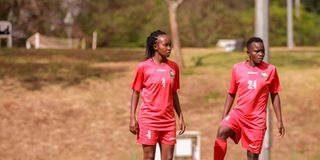A Kenyan Ruben Dias in the making

Juliet Auma (right) with her Harambee Starlets teammate during the 2018 Awcon qualifiers training in 2017.
What you need to know:
- Juliet Auma won the Best Left Centre Back award during the Kenya Women Premier League Awards gala early this month.
- She is a mainstay player at Thika Queens, and was among six players from the club who dominated the awards.
- Last season, Juliet scored five of her team’s 53 goals, all of them through free kicks.
- Juliet has been playing football for over a decade, and made her debut in the Kenya Secondary School Games through her school Archbishop Njenga.
- She was born in Mumias and raised in Malava, and is the only girl in a family of five.
- Before she got into football fulltime, Junior, as she is fondly referred to by her teammates, tried her hand in athletics, competing in 400 metres hurdles.
- Juliet looks up to former Harambee Starlets captain Terry Ouko for her skills on the pitch and her efforts to ensure that women players are recognised.
- She hopes to do the same once she completes her undergraduate degree in sports business and management.
1. How did you get into football?
I started playing with my brothers at home as soon as I joined school. I was the only girl in the family and my brothers were my first closest friends. Through them I got to understand the basics of football. I have fond memories of my brothers and I competing in making the best balls out of plastic bags and ropes during school holidays. We also came up with competitions that were so much fun to participate in that we never bothered to reward winners. Those days, the challenge was to dribble with one leg and if you got to execute it, you were deemed the best player. I miss that simplicity sometimes. As I grew older, I got to understand that football is something I could make a living out of and since I already had the passion, moulding it into a career wasn’t difficult.
2. Many players struggle with transitioning to other careers after retiring. How do you plan to handle that?
This is something I’ve always thought about especially because most women football players struggle financially even while still active. Although I enjoy football now, I know that at some point I will need a fall back plan. This is why I started my chips selling business in May 2020. I also taught myself how to make footballs out of leather in 2012 through a company called Alive and Kicking.
We got to learn how to hand stitch and sell the balls to schools and companies, which can be a sustainable venture. This is the side hustle that keeps me going when we are off season. It is disheartening to see that as a country, we haven’t gotten to that place where footballers can comfortably play and later enjoy the fruits of their hard work after retirement, but I am hopeful that things will get better. Transitioning will always be hard for anyone in any career so I would encourage players to start looking at their options as early as they get signed in teams.
3. What has been your highest moment in your football journey and life so far?
Aside from the Best Left Centre Back award, the highlight of my career was when I got my first call up to the national team in 2017. By that time, I had just been named Player of the Year at Thika Queens. That call up cemented my place in women’s football history. I was very happy with my career progress and even happier that I was called to join the squad that was preparing for the Africa Women’s World Cup qualifiers. It was a very big moment for me. In life, my greatest moment was when officials from Kenya Footballers Welfare Association came to Kayole to support my chips business. They gifted me with better equipment that have so far made my work easier.
4. Where do you see local women’s football in the next five years?
We have come a long way since 2013 and I hope that we will maintain that momentum. I hope the next generation of players will enjoy better playing conditions and facilities, and increased pay. With more female players signing up for teams abroad, the narrative on pay is starting to change because even though they are not paid a lot, their salaries are consistent. I also believe we shall have more female head coaches in the women’s teams, people who fully understand our frustrations. I plan to transition into coaching, and I hope that training programmes will be easily accessible, affordable and improved.
5. What do you do in your free time?
I visit children homes because I love children. I have become friends with some of them. They look up to me and want to play football in future, so I educate them on how the industry is and how they can protect themselves from the mistakes my colleagues and I have made in the past. We also get to play a little football just to get their minds off things as I listen to their dreams and ambitions. It is always refreshing for me to hear how some of them have gotten through tough times and still want to keep going. It inspires me to keep working hard.
nlokeder@ke.nationmedia.com


